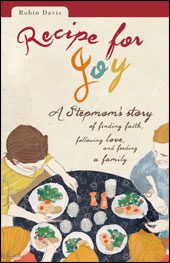As I read Robin Davis’ new book Recipe for Joy: A Stepmom’s Story of Finding Faith, Following Love, and Feeding a Family, I was reminded of another text that joins spirituality and food, Elizabeth Gilbert’s Eat, Pray, Love. Gilbert’s text describes a spiritual-sensual quest outside organized religion and though it ends with relational commitment, Gilbert’s Hindu practices leave her an institutional pilgrim, open to the great spiritual “what’s next?” While I believe Gilbert’s quest is authentic and represents the pathways taken by many seekers, Davis takes a very different path: she finds meaning in commitment to God and church, in her case, the Roman Catholic Church. Both books have a sense of divine synchronicity, whether this synchronicity comes from the hand of God or the movements of karma in our lives.
 As I read Davis’ book, I was reminded of a saying from Augustine’s Confessions: “You have made us for yourself, O Lord, and our hearts are restless until we find our rest in you.” A successful food critic, Davis was clear about her future and her future did not include moving back to Ohio, getting married, and joining an organized religion, indeed, one of most organized religions of them all. Yet, today, she lives in Ohio, is married, and an active Roman Catholic. She believes that divine providence guided her on a path that responded to a deep restlessness she herself barely noticed.
As I read Davis’ book, I was reminded of a saying from Augustine’s Confessions: “You have made us for yourself, O Lord, and our hearts are restless until we find our rest in you.” A successful food critic, Davis was clear about her future and her future did not include moving back to Ohio, getting married, and joining an organized religion, indeed, one of most organized religions of them all. Yet, today, she lives in Ohio, is married, and an active Roman Catholic. She believes that divine providence guided her on a path that responded to a deep restlessness she herself barely noticed.
One of my favorite Biblical narratives pertains to the journey of the magi homeward from the visit to the young child Jesus. Warned of danger to the Christ child, should they return to Jerusalem and King Herod’s court, they returned home by another road. (Matthew 2:12) How many of us end up on another “road” than we had imagined? We planned on one way of life, relationship, locale, profession, only to find that an inner lure or external circumstances take us way off course. In the midst of such changes, and they are often unexpected and painful, we find ourselves in the wilderness, not clear where we are or where we are going, and certainly uncertain about a positive outcome in our journey. But, still we may discover a quiet synchronicity, a gentle providence, guiding our steps, bringing us to “chance” encounters, and opening our eyes to unexpected possibilities.
Davis invokes “God’s plan” as the source of the synchronicities and outcomes of our lives. She is not explicit about how deterministic God’s plan is in terms of the events of our lives. Does God unilaterally bring people into our lives? Does God determine the college that accepts our children? Or, do these events emerge from a multi-factorial interplay of intentionality, accident, chance, and divine providence? I believe God is at work in the details of our lives: that’s part of the meaning of divine omnipresence. God is present in all things. But omnipresence does not necessitate omnipotence. Rather, divine presence leaves room for our freedom and creativity. God’s presence moves through our unconscious, emotions, thoughts, and decisions, not to mention family of origin and life circumstances and history. God’s presence is also moving in the same way in the lives of others. We can always turn the other way or say “no” and miss the vision God has for us at this moment. Still, God does not give up on us, but continues to move through our lives, presenting possibilities and synchronicities, but now involving different people and places.
Robin Davis recognizes that our openness to the movements of divine providence is a “recipe for joy” through which we are often “surprised by joy,” to quote the title of a book by C.S. Lewis. Her simple theology of noticing providence – one which I affirm with perhaps a bit more freedom and free play – will change the way you perceive and live your life. If you believe that divine providence is at work in the world – in your life, in the lives of others, and in encounters – then practically speaking we need always to be on the lookout, keeping our senses open to God-moments or the possibility that we are entertaining angels unaware. Life, from this perspective, is always an adventure in which we constantly ask ourselves, “What new thing is God doing in my life today? What blessings come from this encounter or person? What inspiration is God trying to convey to me?” Life is never boring, always surprising, eternally adventurous, and this is surely a recipe for joy!
For more conversation on Recipe for Joy, visit the Patheos Book Club here.












